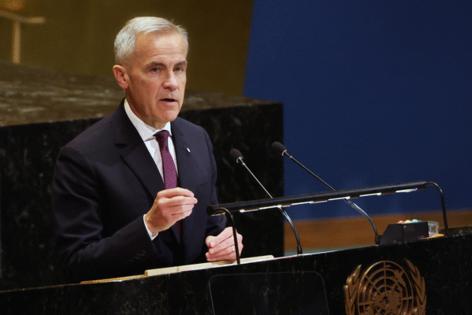Carney touts trade opportunities with China, aims to meet with Xi
Published in News & Features
Canadian Prime Minister Mark Carney said after a meeting with China’s premier that he sees major opportunities for the countries to expand energy and agricultural trade, and expects to eventually sit down with President Xi Jinping.
Carney has sought to ease tensions with the Asian superpower that flared up under his predecessor, Justin Trudeau. U.S. protectionism under President Donald Trump has brought Canada’s need to diversify trading relationships into sharp focus, and China’s tariffs on Canadian canola, pork and seafood are cranking up the economic pain.
“There is a very broad range of commercial relationships that already exist and a much larger range of opportunities for both countries,” Carney said Tuesday following the meeting with Li Qiang on the sidelines of the United Nations General Assembly meetings in New York.
He pointed to clean and conventional energy, noting that China is one of the purchasers of liquefied natural gas from the recently opened LNG Canada terminal on the country’s west coast, which his government wants to see expanded quickly. There are also opportunities in agriculture, he said.
China imposed its tariffs on Canada in response to the Trudeau government’s decision last year to align with the U.S. by adding 100% levies to Chinese electric vehicles, and 25% levies on its steel and aluminum products. While the EV tariffs are currently undergoing a review, removing them now may threaten delicate trade talks with the U.S., ahead of an upcoming review of the U.S.-Mexico-Canada Agreement.
That leaves the question of what Canada can realistically offer China as it seeks relief from agricultural import taxes.
Carney on Tuesday emphasized that Canada has only aligned with “some” U.S. tariffs on China, and he did not specifically highlight the EV levies in his remarks. He instead defended his country’s steel tariffs on China, which it has bolstered with a series of other measures as the Canadian industry is vulnerable to Chinese dumping amid the U.S. levies on the metal.
Carney said he had an “open discussion” with Li about Canada’s steel tariffs and stressed that he is “resolute” about defending the Canadian sector. But there are other areas where the countries can expand their relationship, Carney said, and he and Li have had a “very constructive set of discussions” that he expects to deepen.
“I will expect at the appropriate time to be meeting with President Xi Jinping, but continuing this dialogue with the premier,” he said.
Foreign Affairs Minister Anita Anand plans to meet with her counterparts in China and India in the coming weeks. Canada must “ensure we have a bilateral relationship with significant economic powers in the Indo-Pacific,” Anand said in an interview.
China is Canada’s second-largest trading partner after the U.S., and canola is worth tens of billions of dollars annually to the Canadian economy. Anand said she spoke about the sector with the foreign minister of Pakistan, the world’s third-largest canola importer.
“We will be ensuring that there are alternative trade routes for canola exporters in our country,” she said.
The foreign affairs minister also met Chinese Foreign Minister Wang Yi in July in Malaysia. She said she plans to advance Canada’s interests on trade, climate change, defense and security at their upcoming meeting.
“We need to cooperate with China where we can and challenge them where we must. That’s the heart of our Indo-Pacific strategy and that is the reality of complex diplomatic relationships in 2025,” she said.
On India, Carney’s government has made efforts to repair diplomatic relations after a major feud sparked by the murder of a Sikh Canadian activist in British Columbia. The new head of that Sikh activist group in Canada was recently arrested on gun charges, shortly after publicly accusing India of targeting him with threats to his life.
Anand said domestic public safety is the government’s top priority. She added that Canada’s national security adviser just met with her Indian counterpart, and the two discussed transnational repression.
“We will continue to stay on top of it for the benefit of the safety and security of the Canadian public,” Anand said.
____
(With assistance from Derek Wallbank.)
©2025 Bloomberg L.P. Visit bloomberg.com. Distributed by Tribune Content Agency, LLC.







Comments